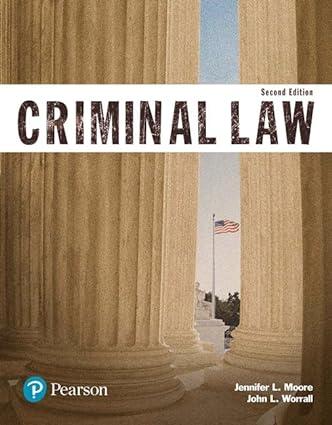Appellant was charged with, among other things, armed robbery and possession of a firearm during a crime
Question:
Appellant was charged with, among other things, armed robbery and possession of a firearm during a crime of violence, both arising from an incident in which, according to the indictment, he forcibly took an iPod from Marcus Curry while brandishing a handgun. The jury acquitted him of these charges but returned a guilty verdict on first-degree theft . . .
We hold that the evidence was insufficient to permit appellant’s conviction of first-degree theft, because the government presented no evidence from which a rational juror could infer that the combined value of the stolen iPod and its contents exceeded $250. Although the proof requirement for theft in the first degree that “the value of the property obtained” was “$250 or more” appears in a penalty statute, § 22-3212(a), not in the definition of “theft,” § 22-3211, our decisions leave no doubt that the issue of value distinguishing first degree (or felony) theft from second degree (or misdemeanor) theft, implicates an element of the offense and must be submitted to the trier of fact.
. . . Here, the government’s proof of value exceeding the statutory amount of $250 was insufficient to rule out a verdict based on “surmise or conjecture.” Perhaps understandably, in a case where the parties disagreed most strongly on whether appellant had forcibly assaulted (i.e., robbed) Curry, and if so whether he had used a firearm, the evidence on the value of the iPod consisted of sparse testimony by Curry and his mother unelucidated by other evidence. Marcus Curry stated that his mother had bought the iPod for him in December 2006 as a Christmas gift (i.e., some four months before the April 12, 2007 theft), and that he believed she had paid $300 for it. But Mrs. Curry corrected this by stating that she had paid “about $250” for the iPod, though with “tax and shipping it came up to about $300.” Marcus Curry further testified that he had “movies and pictures of [himself] and [his] friends and . . . family” on the iPod, and had downloaded “about four hundred or more” songs onto the device. While he had “had to pay” to put the movies on the iPod, “some of [the] songs” were “free downloaded songs” and “some of them you had to pay for.” That was the sum of the value evidence presented to the jury.
Value in this context means the “fair market value” of the property, defined as the “price at which a willing seller and a willing buyer will trade.” Significantly, the determination of market value starts with the “base price” and excludes “ancillary” costs such as shipping and handling, as well as taxes. Thus, we set aside Mrs. Curry’s mention of the amounts in excess of $250 that she paid for the iPod, which left the value of the device at the time of purchase at exactly the statutory dividing line. Our decisions have also made clear, however, that electronic products of this nature have a tendency to depreciate rapidly as technology changes and old versions are replaced. Thus, since no contrary evidence was presented that iPods retain the market value reflected in their purchase price, only speculation allowed the jury to infer that Curry’s device, by itself, was still worth $250 some four months after it was bought.
The government appears to agree up to this point, because it places nearly all of its reliance on the presumed market value of the movies and songs that Curry downloaded onto the iPod.
The word “presumed” here is key, however, because Curry did not state or estimate—as he was not asked—how much he had paid for the downloads, individually or altogether; he offered no opinion on what such items generally cost; and indeed, as to the “four hundred or more” songs, he did not say how many he had paid for at all rather than downloading them “free.” The absence of independent proof of the usual cost of iPod downloads might not be fatal, since “[t]he market value of a chattel . . . may be established by the testimony of its non-expert owner,” but Curry’s testimony merely that he had paid something for an undetermined portion of his songs and for his movies did not allow an inference beyond a reasonable doubt that the iPod and its contents were worth more than the depreciated value of the device alone, which had cost the bare statutory minimum when purchased.
Questions:
1. What is the defendant’s legal argument? Do you agree with his position?
2. Should certain downloaded songs or videos be considered more “valuable” than others when evaluating a larceny or theft case?
Step by Step Answer:






